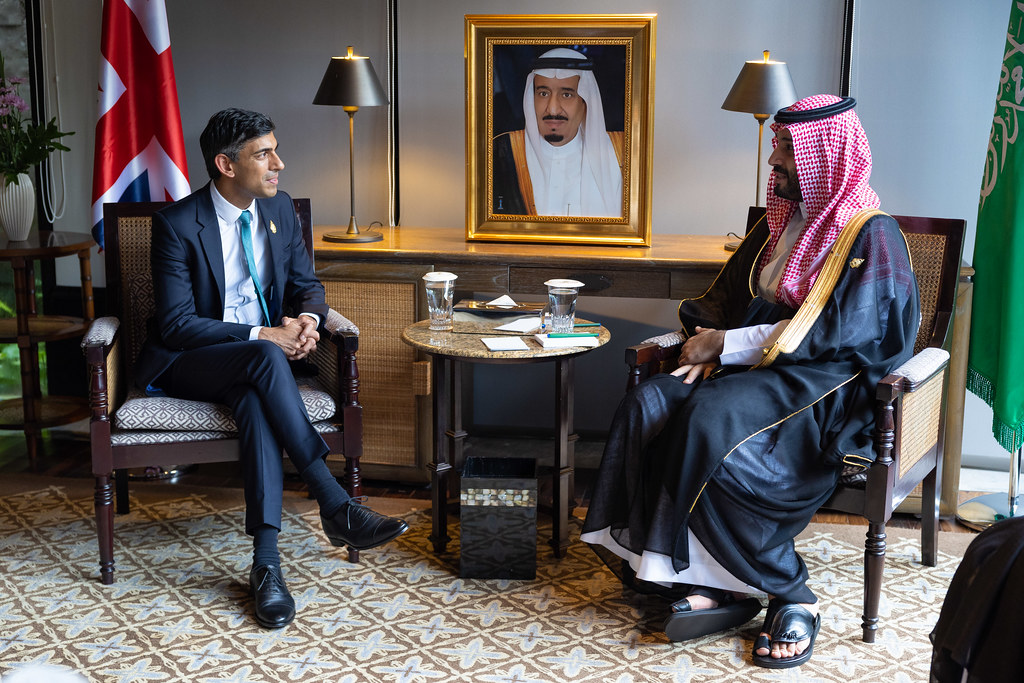Earlier this morning the UK Prime Minister, Rishi Sunak met with Saudi Crown Prince Mohammed bin Salman at the G20. According to comments made on Twitter they: welcomed strong trade relations and collaboration in defence and security; committed to deepening investment ties, and discussed the importance of making progress on social reforms.
While we do not know what was said in the meeting, there is no clarity as to whether this included the increasing clampdown on free expression in Saudi Arabia that has hastened under bin Salman’s leadership. The UK Government has time and time again reiterated its commitment to championing human rights both at home and across the globe but in this case the silence is deafening.
It is not as if there are a scarcity of issues that need to be addressed.
What the Prime Minister could have asked
- Under the guise of cybercrime, the Specialized Criminal Court has been increasingly used to target people who are realising their right to free expression to participate in protected and civic dialogue. This includes Salma al-Shehab, Nourah bint Saeed Al-Qahtani, ten Egyptian Nubians and Dr Lina al-Sharif. What steps are the Saudi authorities taking to ensure the court works in line with international human rights standards to protect free expression?
- Salma al-Shehab was in the UK when she posted comments on Twitter that proved to be the basis of her arrest and imprisonment when she returned to Saudi Arabia. To what extent do Saudi laws impact on dissidents outside of the country and what protections are in place to ensure Saudi Arabia does not damage the right to free expression in other countries, including its allies and trading partners?
- It has been reported that the app, Kollona Amn, or We Are All Security, which is available on both the Apple App Store and Google Play app store was used to draw the Saudi authority’s attention to the tweet sent by Salma al-Shehab. This app has been developed by the Saudi authorities, so can you advise as to what safeguards are in place to ensure the app cannot be used again to violate a Saudi citizen’s right to free expression?
- Bodies and individuals connected to Saudi Arabia are the joint second largest shareholders in the social media platform Twitter. At the same time, a former Twitter manager has been convicted in the USA of spying for Saudi Arabia, accessing private data on users critical of the kingdom’s government. In light of Saudi’s corporate interests in the platform, as well as its commitment to international law and human rights standards, have any steps been taken to ensure that data from the platform is not being used to target dissidents who are engaging in protected acts of free expression?
- As reported by the Electronic Frontier Foundation, Google is setting up, in partnership with the state-owned company Saudi Aramco, a data centre in Saudi Arabia for its cloud computing platform serving business customers. What safeguards are in place to ensure that the centre is protected against improper interference?
- At a time when Saudi Arabia has started opening itself up to tourism and is spending huge amounts of money trying to attract visitors to the Kingdom what is the country doing to reassure those who visit who come from countries with a strong commitment to free expression that they will not be arbitrarily detained or worse if they express their views openly?
A few questions Rishi should have asked himself (but probably didn’t) before the meeting
- Do trade deals and geopolitical relationships with authoritarian governments trump the UK’s commitment to free expression and human rights?
- What are we doing to secure the release of Salma al-Shehab and others connected to the UK who have been imprisoned across the globe for realising their right to free expression, such as Alaa Abd el-Fattah in Egypt and Sophia Huang Xueqin in China?
- Is there anything the UK can do to better protect the public’s right to free expression, particularly those residing in the UK who are increasingly being targeted by the extraterritorial extension of laws by authoritarian regimes beyond their borders?
A couple of questions Rishi should ask himself in a darkened room when no one else is around
- Is the UK still a leader in protecting free expression and human rights across the globe?
- Was it ever?






